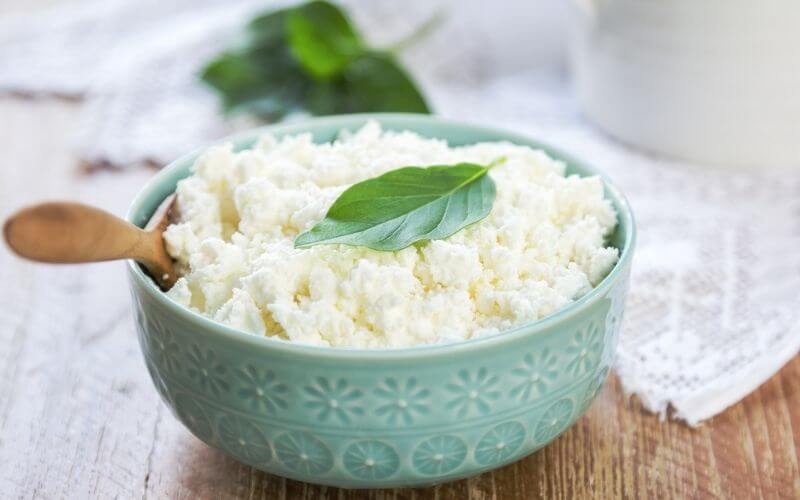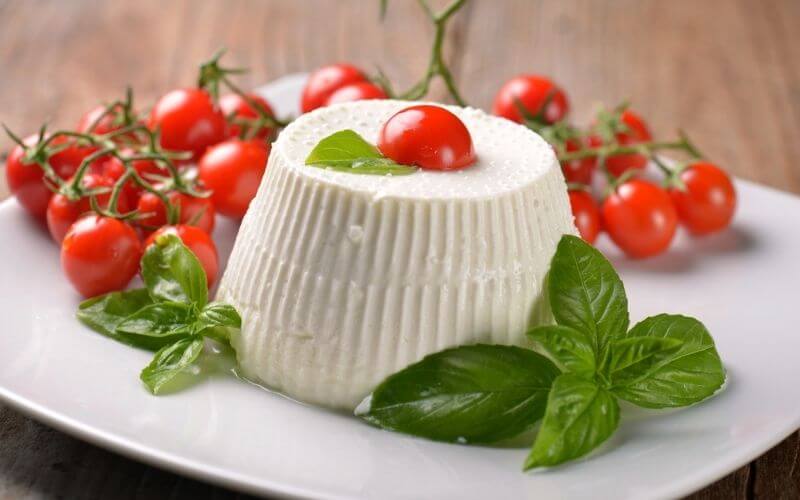I’ve recently had a little mishap when ordering my groceries. I messed up and ordered multiple items when I only needed one of each.
So instead of just a single tub of ricotta cheese (which was much more than I needed anyway), I ended up with 5 tubs.
Yeah, I know it was a pretty dumb move. And I’ll double-check my groceries from now on.
But in the meantime, I needed to use up four and a half tubs of ricotta before they went bad. I baked a lovely ricotta lemon pound cake.
Then a ricotta cheesecake with raspberry compote. For dinner, the menu was a tomato and ricotta salad, followed by ricotta-stuffed pasta shells. And so many servings of lasagna with ricotta.
And then came the inevitable question: can you freeze ricotta cheese? After all, I’ve frozen cottage cheese and mozzarella before, so why not ricotta?
After a little research and experimenting, I have an answer to the question: can ricotta cheese be frozen? This article won’t just spill the beans on whether you can freeze ricotta; I’ll also go into the details on this underrated cheese.
Ricotta Cheese and Why You Shouldn’t Sleep on It

Ricotta is often ignored for mozzarella, parmesan, and mascarpone, but this cheese deserves more hype than it gets. Ricotta cheese is gloriously creamy and fluffy and this makes it great for baking, cooking and added fresh to salads and dips.
It is a whey cheese and is made by heating whey with milk. This is where the name comes from─ ricotta means recooked in Italian, as the whey produced from making yogurt or mozzarella is cooked again to make this cheese.
The whey is heated with a small amount of milk and once it reaches the desired temperature an acid (like vinegar or lemon juice) is added to curdle the liquid and create curds that coagulate. The curds are then drained of the excess whey in cheesecloth until they form the fluffy ricotta.
The process also means that ricotta is a soft, fresh cheese. There’s no drying or aging and the moisture makes it nice and spreadable. Aged cheeses like parmesan are hard and dry, while fresh ones like ricotta and cream cheese are soft and fluffy.
The downside? Fresh cheeses go bad faster than aged ones. Store-bought ricotta needs to be consumed before the expiry date. Ricotta made at home is edible when stored in the fridge for a week.
But the advantages of ricotta cheese far outweigh this annoying drawback. For starters, it tastes amazing; light, tangy, and not overpowering. And it’s just so versatile.
You can use it in quick meals like sandwiches and salads. It is great when used as spreads and added to dips. Ricotta is also a good substitute for cream cheese.
And the uses for baking go on and on. Classic ricotta cakes are delicious and they make for a great alternative to heavy cheesecakes.
When added to baked pasta dishes, they add lots of dimension and flavor. Add an egg and use it in moussaka and lasagna instead of store-bought cheese sauces or bechamel.
Why put egg in ricotta cheese in lasagna? It helps the cheese bind to the layers of the lasagna or casserole and prevents the ricotta from oozing out in the oven.
In short, ricotta cheese is amazing and you should use it more often in your cooking.
Freezing Ricotta Cheese: Everything You Need to Know

Now that I’ve sung all the praises of ricotta cheese, let’s settle down and talk freezing strategies. The one thing any home or pro cook will tell you is that ricotta is one of the worst cheeses for freezing.
Why? Ricotta has a high moisture content with lots of water in the whey. When frozen, the water will freeze and form ice crystals.
When thawed, the crystals melt and this causes the whey to separate out from the cheese, altering its texture. But while the texture changes, the flavor will stay the same.
So how does one go about freezing ricotta cheese? Follow the steps below for the best results.
Freezing the Ricotta Cheese:
The freezing method mentioned below will preserve the texture as much as possible.
- If you want to store unopened ricotta cheese from the store, simply store the container in the freezer. If you have multiple containers, you can store them in a big Tupperware box or a large freezer bag.
- If you want to freeze previously opened containers of cheese, it is best to portion out the cheese and wrap them in cling film or plastic wrap. This will make it easier to take out the amount needed to thaw when cooking.
- Take the wrapped portions of cheese and stack them in a large freezer bag. Push as much air as you can from the bag before placing them in the freezer.
- You can also put the wrapped portions in a separate container or box and freeze them. This double wrapped method is the best way to freeze ricotta, especially for storing over 3-4 weeks.
How long can you freeze ricotta cheese? Most cooking experts say that 2 months is the best time. Make sure you use up the ricotta by then.
Defrosting the Ricotta Cheese:
Knowing how to defrost ricotta the right way makes the cheese safe to eat, and easier to work with.
- Remove the ricotta from the freezer 4-6 hours before you need it for cooking.
- Do not defrost the cheese on your counter, as this can encourage microbial growth and cause food poisoning and other abdominal issues.
- Instead, defrost the cheese in the fridge for no longer than 5 or 6 hours, as this can alter the texture even further.
- As the ricotta defrosts, stir the cheese with a spoon or fork from time to time. This will mix the whey with the cheese curds and improve the overall consistency.
Using Defrosted Ricotta Cheese:
As I mentioned, the texture of the cheese changes after you freeze it. Because of this, you won’t be able to use it the same way you’d use fresh ricotta. The slightly gritty, grainy texture means that it won’t be easily spreadable and fluffy.
As a result, you should avoid using it in things like salads, sandwiches, as well as a topping or garnish. Instead, add it to cheese sauces made from scratch, or use it to give bechamel a tangy and flavorful touch.
Frozen ricotta works best in cooked or baked dishes like pasta dishes, mac, and cheese, lasagna, pastitsio, or moussaka. Ricotta can also be used instead of cream cheese to thicken alfredo sauce.
It also works well in things like cheesy breads, pizza, and calzones. You can even use it in stuffed pancake recipes. However, stick to the fresh stuff when baking cakes or pies.
Tips for Freezing Ricotta Cheese
The following tips will make sure you can preserve the ricotta cheese’s texture as much as possible.
- Remove the ricotta from its original container and place the cheese on layers of kitchen towels or napkins to absorb as much of the excess whey as possible.
- As the ricotta freezes, stir the cheese with a fork or tiny whisk, as you would when making ice cream at home.
- If you have already used some of the cheese, freezing it in airtight wrapping is your best bet.
- Always double wrap when freezing and make sure that you push out as much air as possible with each plastic wrap or bag.
- Write the date you froze the cheese on the plastic bag with a marker so you know when to use it safely.
- To make equally sized portions, place pieces of clingfilm in an ice cube tray and freeze the ricotta in the tray. Once frozen, remove the wrapped pieces of cheese and place them all in a large freezing bag, pushing out the air before sealing and putting them back in the freezer.
- If you can’t stir the melted whey into the cheese curds while thawing, drain the moisture by placing the defrosted cheese on a colander or strainer for 10-15 minutes. You can also set it on several paper towels.
- Instead of freezing the cheese itself, make large batches of pasta or sauces with the ricotta and freeze them instead. A good idea would be freezing lasagna, cut up into individual portions for quick and easy thawing and reheating.
- Can you freeze ricotta cheese with eggs in it? Yes, and the egg helps hold the cheese together and reduces its chances of splitting. This makes a great base for cheesecakes, as well as topping ziti, stuffing shells, and use in casseroles and pastitsio.
Making Ricotta at Home

Instead of buying huge containers of ricotta and dealing with the chaos of freezing them, you can easily make a small batch of ricotta at home and use it immediately in recipes that call for it.
Of course, it takes time and a little experience, but you’ll find that it makes for a fun project.
What You Need:
- 2 quarts of whole milk (You can replace some of this milk with whey from yogurt or kefir.)
- 1 cup of heavy cream
- ½ teaspoon of salt
- 2 tablespoons of white vinegar
- Large colander or sieve
- Cheesecloth or thin muslin
What You Need to Do:
- Line a large sieve or colander with a layer of cheesecloth and place it over a big pot or bowl.
- Bring the milk, cream, and salt to a rolling boil in a heavy pot over medium heat, stirring constantly to prevent scorching. You can also use a double boiler.
- Add the vinegar, then reduce heat to low and simmer, stirring constantly, until the mixture starts to curdle which takes a minute or two. Gradually the curds will coagulate and become one big mass.
- Pour this mixture into the lined sieve and allow it to drain for an hour.
- Discard the liquid, and then cover and chill the ricotta, letting it set.
Got Any More Questions?
Here you will find answers to questions people tend to have about freezing ricotta.
01. Can I Freeze Ricotta Cheese?
You can absolutely freeze ricotta, but be aware that the texture will change considerably.
02. How to Use Ricotta Cheese?
Ricotta cheese can be used in baked goods like cookies and cheese. It is also commonly used in lasagna, pastitsio, stuffed shells, and baked ziti, as well as mac and cheese.
03. How to Defrost Cheese?
Defrost cheese safely by putting it in the fridge to thaw for 4-5 hours before you need to use it.
04. How Long Does Frozen Ricotta Cheese Last?
Once in the freezer, ricotta will be good to use for up to 2 months.
05. Can I Freeze Ricotta and Spinach Together Safely?
Yes, mixtures of ricotta and vegetables, herbs, and eggs can be frozen; although the texture may change slightly in these mixtures.
To Summarize
Well, there you have it. The answer to the question can you freeze ricotta cheese? Yes, you can freeze it but you won’t end up with the soft fluffy clouds of cheese we know and love so well.
Either way, it is a good way to have ricotta on hand for baked pasta dishes, moussaka, pizzas, and other rich dishes. So the next time you’re bombarded with excess containers of ricotta, you’ll know exactly what to do.
